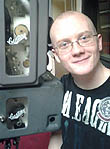|
|
 
|
|
Author
|
Topic: tip: disable auto screen blanking on Doremi server
|
Scott Norwood
Film God

Posts: 8146
From: Boston, MA. USA (1774.21 miles northeast of Dallas)
Registered: Jun 99
|
 posted 01-24-2016 03:27 PM
posted 01-24-2016 03:27 PM





Most (all?) Doremi servers will automatically blank the screen after fifteen minutes of inactivity. This is annoying.
There are two ways around this, at least on version 2.6.4 (which is what I used to verify them):
Way #1:
select menu->system->terminal
in the terminal, type the following two lines, hitting return after each one:
xset s off
xset -dpms
Any user can do this easily, but it will not persist across system reboots. It is rather fool-proof and will not damage the system in any way.
Way #2:
This method will persist across reboots, but requires the root password (readily available, but I will not post it here) and some knowledge of Linux and the vi text editor. Note that this is potentially dangerous and can possibly screw up the operating system if not done correctly.
select menu->system->terminal
In the terminal, type
su
and hit return. Then, type in the root password when prompted.
Then, remount the root partition as read-write; type
mount -o rw,remount /
cd /etc/X11
cp xorg.conf xorg.conf.old
vi xorg.conf
Search for the line that says
Option "OffTime" "15"
and change the "15" to "0"; do _not_ change anything else in that file.
Quit and save the file.
edit: method #2 requires a reboot in order to take effect
[ 01-25-2016, 05:43 AM: Message edited by: Scott Norwood ]
| IP: Logged
|
|
|
|
|
|
|
|
|
|
|
|
|
|
|
|
|
|
|
|
|
|
All times are Central (GMT -6:00)
|
|
Powered by Infopop Corporation
UBB.classicTM
6.3.1.2
The Film-Tech Forums are designed for various members related to the cinema industry to express their opinions, viewpoints and testimonials on various products, services and events based upon speculation, personal knowledge and factual information through use, therefore all views represented here allow no liability upon the publishers of this web site and the owners of said views assume no liability for any ill will resulting from these postings. The posts made here are for educational as well as entertainment purposes and as such anyone viewing this portion of the website must accept these views as statements of the author of that opinion
and agrees to release the authors from any and all liability.
|

 Home
Home
 Products
Products
 Store
Store
 Forum
Forum
 Warehouse
Warehouse
 Contact Us
Contact Us




 Printer-friendly view of this topic
Printer-friendly view of this topic












